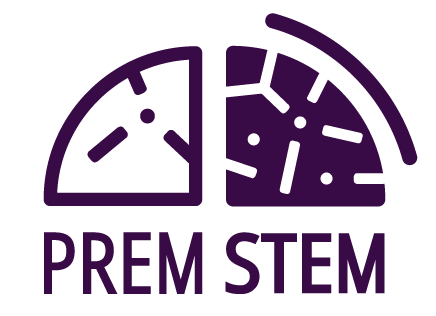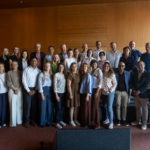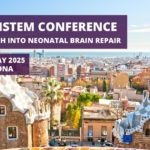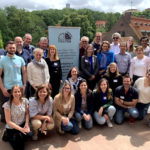Once again, a busy year for PREMSTEM with progress made across all scientific work packages as well as an acceleration in the dissemination of our results through new publications and conference talks. Furthermore, planning is underway for our own conference in May 2025.
This year, the European Commission approved an extension of PREMSTEM until the end of 2025, mainly due to delays we experienced in our scientific work during the Covid pandemic. We also received positive feedback in the recent review meeting with external reviewers.
Scientific progress
Our labs continue to investigate the potential of human mesenchymal stem cells (H-MSCs) originating from umbilical cord tissue as a potential treatment option for brain injury related to preterm birth. The following is a summary of the work that has taken place this year.
The teams at the University of Maastricht and RMIT University have completed the short-term investigations in the large animal inflammation and hypoxia models showing small but positive effects of the H-MSCs. They have now commenced the long-term inflammation and hypoxia studies in the large animal models.
The UMCU team is leading the studies on the effect of our stem cells on different cell types in the brain. Promising beneficial or rescue effects of the stem cells are being observed in all target cells – including microglia, neurons and oligodendrocytes. In some cases, stem cells that undergo preconditioning – a sort of pre-activation step – with hypoxic or creatine are showing superior effects compared to naïve stem cells.
The University of Maastricht is in the middle of performing comprehensive experiments on the biodistribution of H-MSCs in newborn sheep and rats challenged by foetal inflammation-postnatal hypoxia. These studies are critical to knowing where the cells end up and how long they survive.
In the package of works co-ordinated by Universitätsklinikum Essen, functional and morphological differences have been assessed in three out of the five small animal models so far by the University of Gothenburg, Inserm and UMCU teams. These data indicate promising long-lasting effects of stem cell treatment across behavioural domains and on a microstructural level.
Thanks to the Iconeus technology, preliminary studies have been performed in small animal models to investigate the cerebro-vascular alterations in neuroinflammatory disease.
2024 peer-reviewed publications
| C-section and systemic inflammation synergize to disrupt the neonatal gut microbiota and brain development in a model of prematurity Brain, Behavior, and Immunity | Authors: Cécile Morin, Flora Faure, Julie Mollet, David Guenoun, Ariane Heydari-Olya, Irvin Sautet, Sihao Diao, Valérie Faivre, Julien Pansiot, Lara Tabet, Jennifer Hua, Leslie Schwendimann, Amazigh Mokhtari, Rebeca Martin-Rosique, Sead Chadi, Mireille Laforge, Charlie Demené, Andrée Delahaye-Duriez, Rochellys Diaz-Heijtz, Bobbi Fleiss, Boris Matrot, Sandrine Auger, Mickael Tanter, Juliette Van Steenwinckel, Pierre Gressens and Cindy Bokobza |
| Human Umbilical Cord-Mesenchymal Stem Cells Promote Extracellular Matrix Remodeling in Microglia Cells | Authors: Marta Tiffany Lombardo, Martina Gabrielli, Florence Julien-Marsollier, Valérie Faivre, Tifenn Le Charpentier, Cindy Bokobza, Deborah D’Aliberti, Nicola Pelizzi, Camilla Halimi, Silvia Spinelli, Juliette Van Steenwinckel, Elisabetta A. M. Verderio, Pierre Gressens, Rocco Piazza and Claudia Verderio |
| Extracellular Vesicle-Mediated Neuron–Glia Communications in the Central Nervous System Journal of Neuroscience | Authors: Tsuneya Ikezu, Yongjie Yang, Claudia Verderio and Eva-Maria Krämer-Albers |
| Neonatal inflammation impairs developmentally-associated microglia and promotes a highly reactive microglial subset Brain, Behavior, and Immunity | Authors: Adrien Dufour, Ariane Heydari Olya, Sophie Foulon, Clémence Réda, Amazigh Mokhtari, Valérie Faivre, Jennifer Hua, Cindy Bokobza, Andrew D. Griffiths, Philippe Nghe, Pierre Gressens and Andrée Delahaye-Duriez and Juliette Van Steenwinckel |
| Timed fetal inflammation and postnatal hypoxia cause cortical white matter injury, interneuron imbalances, and behavioral deficits in a double-hit rat model of encephalopathy of prematurity Brain, Behavior, & Immunity – Health | Authors: M.J.V. Brandt, C.M. Kosmeijer, E.J.M. Achterberg, C.G.M. de Theije and C.H. Nijboer |
| Transfontanellar shear wave elastography of the neonatal brain for quantitative evaluation of white matter damage Scientific Reports | Authors: Flora Faure, Marianne Alison, Mariantonietta Francavilla, Priscilla Boizeau, Sophie Guilmin Crepon, Chung Lim, Gregory Planchette, Mickael Prigent, Alice Frérot, Mickael Tanter, Charlie Demené, Olivier Baud and Valérie Biran |
| Uncovering the Role of Inflammation with Asphyxia in the Newborn Clinics in Perinatology | Authors: Simerdeep K. Dhillon, Pierre Gressens, John Barks and Alistair J. Gunn |
| Preterm birth: A neuroinflammatory origin for metabolic diseases? Brain, Behavior, & Immunity – Health | Authors: Sihao Diao, Chao Chen, Alexandre Benani, Christophe Magnan, Juliette Van Steenwinckel, Pierre Gressens, Céline Cruciani-Guglielmacci, Alice Jacquens and Cindy Bokobza |
| A Neonatal Rodent Model of Retroorbital Vein Injection Journal of visualized experiments | Authors: Eridan Rocha-Ferreira, Syam Nair, Owen Herrock, Erik Axel Andersson, Carl Joakim Ek, Carina Mallard and Henrik Hagberg |
| Quantification of brain-wide vascular resistivity via ultrafast Doppler in human neonates helps early detection of white matter injury Journal of Cerebral Blood Flow & Metabolism | Authors: Flora Faure, Jérôme Baranger, Marianne Alison, Béatrice Boutillier, Alice Frérot, Chung Lim, Grégory Planchette, Mickael Prigent, Mickaël Tanter, Olivier Baud, Valérie Biran and Charlie Demené |
There is a full list of PREMSTEM-affiliated publications on our website.
Annual meeting
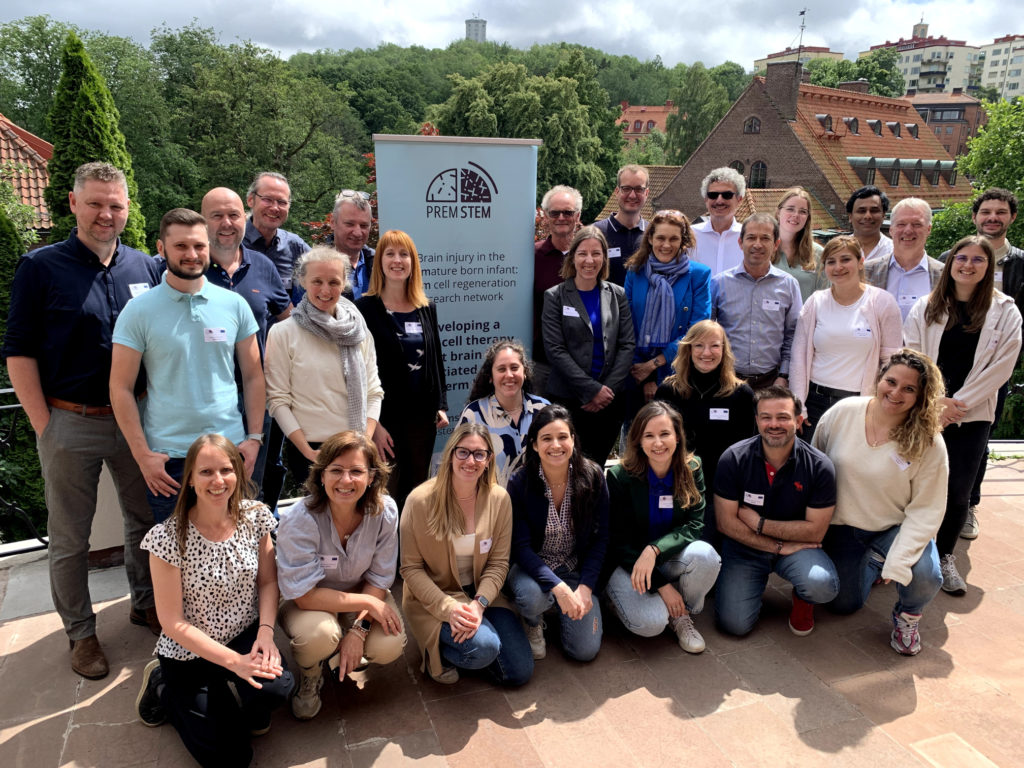
In June we got together in Sweden for the PREMSTEM annual meeting which was organised by Henrik Hagberg at the University of Gothenburg. Some of us then made a short trip north to participate in the Hershey Conference.
At the annual meeting, our young investigators had an opportunity to present their latest PhD and postdoctoral research. We heard from all lab heads about PREMSTEM’s scientific progress, and our colleagues Nicola Pelizzi and Fabrizio Facchinetti from Chiesi delivered a comprehensive presentation about the future of our research, including the steps that would be required to initiate clinical trials.
Our next in person scientific meeting will be hosted by RMIT Europe in Barcelona before the PREMSTEM Conference.
Science dissemination
Besides publishing in journals, our PREMSTEM colleagues have been busy disseminating the results of the project at scientific meetings and conferences.
At the 14th Hershey Conference on Developmental Brain Injury, I gave a talk on ‘Inflammation and preterm brain injury’ and Daan Ophelders from Maastricht University presented on ‘Structural brain injury is accompanied by neurocognitive impairment in ex-preterm lambs: insights from an ovine model’. One of our advisory board members, Deirdre Murray, spoke about ‘Molecular markers of HIE and application of AI’.
Several PREMSTEM researchers also presented posters, including Sara De Palma from UMCU (‘Characterizing mammillary bodies damage following hypoxic-ischemic brain injury in a neonatal mouse model’) and Meray Serdar from Universitätsmedizin Essen (‘Protective effect of human mesenchymal stem cells on a model of neonatal brain injury’).
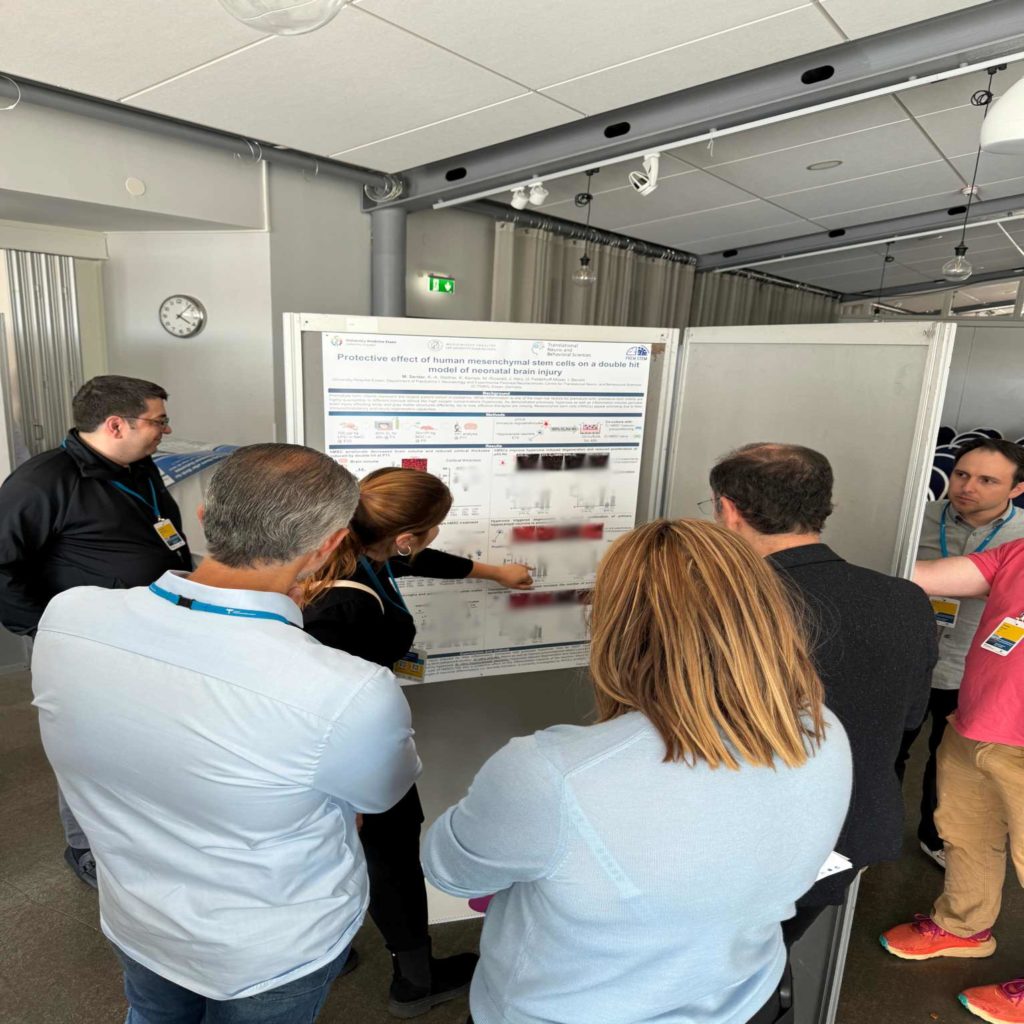
PREMSTEM partner the Cerebral Palsy Alliance (CPA) co-hosted the 2024 Neonatal Cell Therapies Symposium in Sydney, Australia in partnership with Monash University. Manon Benders delivered a presentation about the PASSIoN trial which has been running in the NICU at UMCU. In this trial, the team which also includes PREMSTEM researcher Cora Nijboer has been assessing the safety and feasibility of intranasal delivery of bone marrow-derived mesenchymal stromal cells to babies with perinatal arterial ischemic stroke.
CPA researcher Megan Finch-Edmondson talked about progress being made and the challenges being faced in the design of an Australian Phase I trial of neural stem cells to treat cerebral palsy and gave an update on cord blood for cerebral palsy alongside Iona Novak.
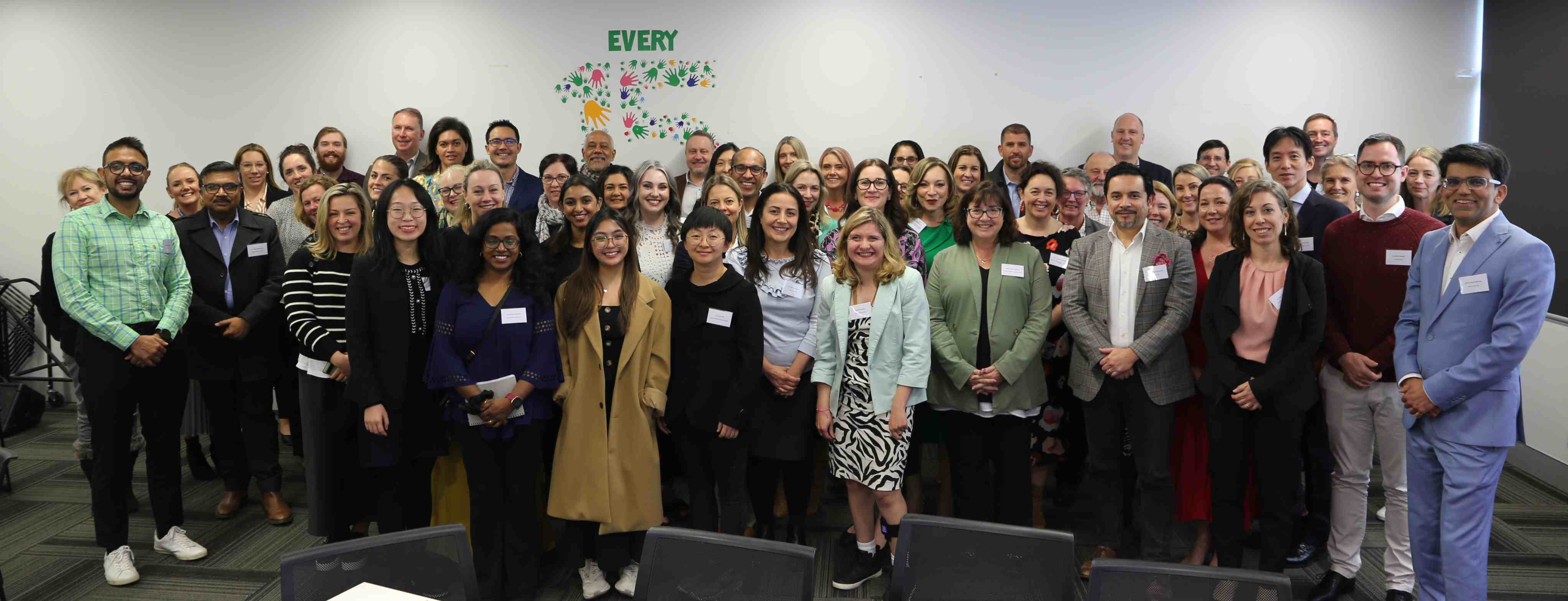
Tim Wolfs from Maastricht University was an invited speaker at the European Society of Reproductive Immunology (ESRI) Conference held in Leiden, The Netherlands. The conference was co-organised by Renate van der Molen from the PREMSTEM team at Radboudumc, Tim presented the importance and possibilities of large animal models to better understand the induction of short- and long-term adverse outcomes following preterm birth and perinatal inflammation, and the potential of stem cell therapy as a promising treatment option.
In Vienna, PREMSTEM researchers attended and presented at the 10th Congress of the European Academy of Paediatric Societies (EAPS 2024). In a special workshop called ‘Translational research in perinatology’, Bobbi Fleiss from RMIT University, Ivo Bendix from Universitätsmedizin Essen and Tim Wolfs from Maastricht University gave presentations about pre-clinical models and their applications within the transnational perinatology domain.
In his talk ‘Causes and consequences of perinatal brain injury – basic research perspective’, Ivo spoke about the importance of understanding neutrophil biology in perinatal brain injury. He described how after injury, we see multiple waves of infiltration – populations that injure and populations that can protect. He concluded that in the future, modulating migration into the brain may prevent injury.
I presented ‘What is new in brain therapeutics for extremely preterm neonates’ and co-chaired a session with Deirdre Murray about stem cell therapies for perinatal brain injury and in her talk ‘Mesenchymal cells for perinatal arterial ischemic stroke’, Manon Benders from UMCU spoke about forging a path to the first treatment for paediatric stroke, from preclinical to clinical trials.
Engaging our stakeholders through co-creation
This year we completed our co-creation activities and submitted a report to the European Commission on the outcomes of the 10 workshops and 16 interviews organised by the team at RMIT Europe. A session will be held at the PREMSTEM Conference reflecting on how to engage external stakeholders in research.
Communicating our research
Keep following PREMSTEM on LinkedIn and X to hear the recent updates about the project and keep an eye on our website where we add new information and resources, including translations of fact sheets. We also have a YouTube channel with short videos.
Awards, nominations, other personal successes
Cora Nijboer and Manon Benders from UMCU are part of a team awarded €5 million to further investigate mesenchymal stem cells (MSCs) as a therapy for term newborns with brain damage. The new study is called iSTOP-CP also involves Maastricht UMC+. The researchers will test the efficacy of a stem cell therapy administered intranasally, building upon a promising safety study in which the team treated ten term babies with perinatal stroke using nasal drops containing donated MSCs. The iSTOP-CP researchers will include 162 term babies who sustain brain damage around birth in the study.
Mickael Tanter is among the 18 new elected members who will join the French Academy of Sciences in 2025. His election is a recognition of his outstanding scientific career, conducted at the junction between physics, medicine and biology.
PREMSTEM Conference
As we enter the final year of project, we look forward to more exciting results and presenting some of them at the PREMSTEM Conference (13-15 May 2025) in Barcelona. Register now to join us online or in person. To be involved in the programme, we are also accepting abstracts.
Acknowledgements
Thanks to all members of the PREMSTEM team past and present for another productive year. Many thanks also to our Patient/Consumer Advisory Board and members of our ethics and innovation management advisory boards for their continued contributions to the project. We look forward to catching up with many of you in Barcelona next May.
Finally, a thank you to everyone who continues to follow the progress of the project. I wish everyone a relaxing festive period and we will see you in 2025.
Pierre Gressens, PREMSTEM Coordinator, Inserm
